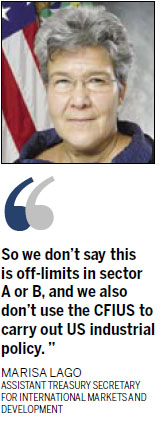US
Treasury's watchdog looks to take sting out of reviews
By Tan Yingzi (China Daily)
Updated: 2010-09-02 17:30
 |
Large Medium Small |
WASHINGTON - Four months after Marisa Lago became the US Treasury's assistant secretary for International Markets and Development in February, she visited Shanghai to attend a forum and to meet Chinese business people.
Now, amid the continuous controversies over Chinese investment in the US, she will visit China again later this year to woo investors and to launch an "educative and informative campaign" about Committee of Foreign Investment in the United States (CFIUS), a multi-agency panel headed by the US Treasury Department to review foreign investments that might pose a national security threat to the US.

"We welcome investments from China as we welcome investments from any other countries," Lago, who coordinates the CFIUS process, told China Daily.
"We welcome Chinese investment from both private and State-owned enterprises. This is a long-standing US (position) and it has also broad bipartisan support."
As more and more Chinese enterprises seek to invest in the US to echo the government's call of "going out," investors often get frustrated by news that some plans for the US had to be withdrawn over national security concerns. Such controversial projects have worsened China-US trade relations.
In the US, there is also a longstanding debate over whether big Chinese companies, especially those owned by the State, should be allowed to invest in the US' sensitive industries.
The recent cases about China's Anshan Iron & Steel Group and Huawei Inc, the telecommunication equipment supplier, have raised dissatisfaction and even anger among Chinese officials and business leaders.
In July, a bipartisan group of 50 US lawmakers, citing national security, called on CFIUS to review Anshan's investment plan in a US start-up steel company in Mississippi.
Two weeks ago, CFIUS was asked by eight Republican senators to scrutinize Huawei's bid to supply telecommunications equipment to Sprint Nextel.
Lago said CFIUS treats all potential investments "the same way".
"Foreign investments - whether from China or from any other countries - are viewed through the same lens: Does a particular investment pose a threat to national security and are there any unresolved questions about national security?
"If they can be resolved, the transactions can go through."
Because of confidentiality reasons, Lago would not comment on specific cases.
In 2005, CFIUS received one notice of Chinese investment; in 2006, none; in 2007, three; in 2008, six. The figure for last year will be released in coming weeks.
"It appears to be consistent with China's going-out policy," she said.
But facing mounting inquiries from investors and media about the kind of investment that may pose a national threat to the US, Lago may not be able to clear it up.
"Unlike many other countries, we don't have protected sectors, or prohibited sectors or industries," she said.
"So we don't say this is off-limits in sector A or B, and we also don't use the CFIUS to carry out US industrial policy. And we don't have economic concerns."
She said the CFIUS focus is on national security and is on a case-by-case basis.
Lago welcomes Chinese investors to contact CFIUS if they have any questions about the process. "We don't want to be a mystery," she said.
China has been investing a lot of money in the US, but due to limited business opportunities, 94 percent of it has gone to low-yield US government bonds.
In 2005, China National Offshore Oil Corporation gave up trying to acquire Unocal Oil Company as the proposed merger was viewed in the US as a threat to American security.
For the same reason last year, a Chinese mining company backed out of investing in a Nevada gold mine after a CFIUS review raised security concerns as the mine was about 100 km from a base the US Navy uses to train its pilots.
Thomson Financial said that since 2000, there have been more than 100 transactions involving Chinese investments in the US, ranging from financial services to manufacturing, natural resources, pharmaceutical and high-tech sectors.
By June last year, the total value of Chinese companies' outbound direct investment (ODI) in the US was $3.1 billion while the US ODI in China reached $61 billion, China's Ministry of Commerce said.
China Daily